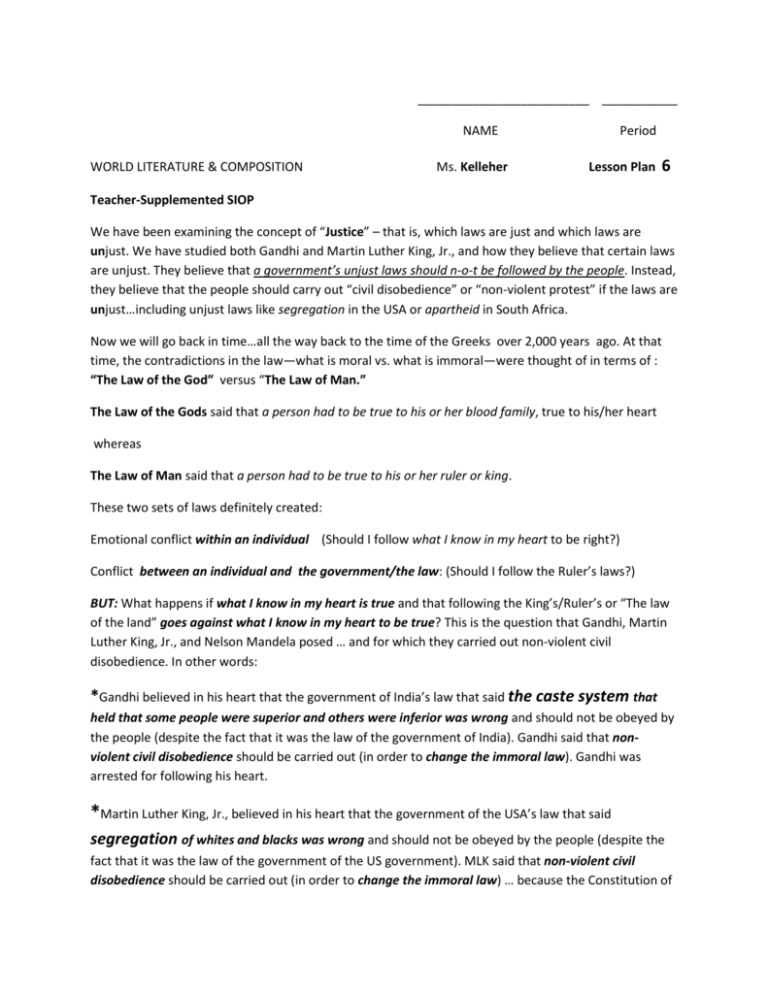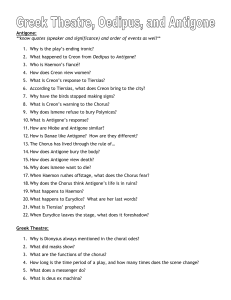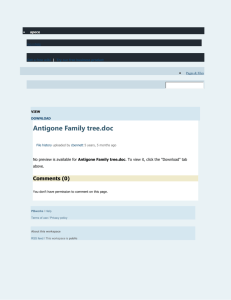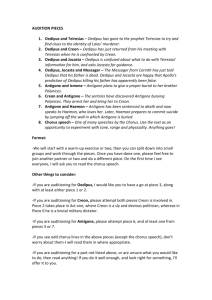World Lit LP #6 Greek Theater Antigone & Family
advertisement

_________________________ ___________ NAME WORLD LITERATURE & COMPOSITION Ms. Kelleher Period Lesson Plan 6 Teacher-Supplemented SIOP We have been examining the concept of “Justice” – that is, which laws are just and which laws are unjust. We have studied both Gandhi and Martin Luther King, Jr., and how they believe that certain laws are unjust. They believe that a government’s unjust laws should n-o-t be followed by the people. Instead, they believe that the people should carry out “civil disobedience” or “non-violent protest” if the laws are unjust…including unjust laws like segregation in the USA or apartheid in South Africa. Now we will go back in time…all the way back to the time of the Greeks over 2,000 years ago. At that time, the contradictions in the law—what is moral vs. what is immoral—were thought of in terms of : “The Law of the God” versus “The Law of Man.” The Law of the Gods said that a person had to be true to his or her blood family, true to his/her heart whereas The Law of Man said that a person had to be true to his or her ruler or king. These two sets of laws definitely created: Emotional conflict within an individual (Should I follow what I know in my heart to be right?) Conflict between an individual and the government/the law: (Should I follow the Ruler’s laws?) BUT: What happens if what I know in my heart is true and that following the King’s/Ruler’s or “The law of the land” goes against what I know in my heart to be true? This is the question that Gandhi, Martin Luther King, Jr., and Nelson Mandela posed … and for which they carried out non-violent civil disobedience. In other words: *Gandhi believed in his heart that the government of India’s law that said the caste system that held that some people were superior and others were inferior was wrong and should not be obeyed by the people (despite the fact that it was the law of the government of India). Gandhi said that nonviolent civil disobedience should be carried out (in order to change the immoral law). Gandhi was arrested for following his heart. *Martin Luther King, Jr., believed in his heart that the government of the USA’s law that said segregation of whites and blacks was wrong and should not be obeyed by the people (despite the fact that it was the law of the government of the US government). MLK said that non-violent civil disobedience should be carried out (in order to change the immoral law) … because the Constitution of the USA states that all men are created equal. MLK was imprisoned in the Birmingham Jail for following his heart. *Nelson Mandela believed in his heart that the government of South Africa’s apartheid system that forced the legal segregation of whites and blacks was wrong and should not be obeyed (despite the fact that it was the law of the South African government). Nelson Mandela said that non-violent disobedience should be carried out (in order to get the immoral law changed). Nelson Mandela was imprisoned for 27 years for following his heart. The Greeks knew that when an important person (usually a king, queen, or daughter of a king or a queen) chose to follow her heart --like Antigone chose to do--it would lead to tragedy because, by following her heart, Antigone was disobeying the King’s law and the King had already stated that—if anybody disobeyed his law—that person would be put to death. This is what led to a tragic situation. The Greek playwright named Sophocles wrote a drama about Antigone…who followed her heart and would not obey the law of King Creon. This drama—or play—is a tragedy. What is at the essence even more tragic is that Antigone is a family relation to the King—she is King Creon’s niece -- they are part of the same family, The Family of Cadmus. 1.Look at the different characteristics of “Tragedy” on pages 279 & 280 in your Springboard text. Discuss these with your group. With your group, decide what you think are the three most important characteristics of tragedy. One of the most important characteristics of tragedy is _______________________________________. A second most important characteristic of tragedy is _________________________________________. A third most important characteristic of tragedy is ___________________________________________. 2.The Chorus plays a very important role in the Greek theater. Examine the various characteristics of the Chorus that are noted on page 280 of your Springboard textbook. Answer the following questions. The Chorus can be defined as ____________________________________________________________ ____________________________________________________________________________________. The Chorus carried out many different roles during the play or tragedy. Note these roles below: l)______________________________________ 2)________________________________________ 3)_____________________________________ 4) ________________________________________ 5)_____________________________________ 3. The Greek tragedy that we will read and analyze is called Antigone. Antigone is a complete play, but it is a part of a cycle of three plays, include Oedipus Rex and Oedipus at Colonus. Therefore, Sophocles wrote three plays, and they were all about one royal family: The Family of Cadmus. Answer the following questions about the tragedy Antigone. (See page 281 in your Springboard text.) There was a curse put on The Family of Cadmus for a crime committed against the gods, because The Law of God was broken. This curse involved three royal members of The Cadmus Family. The Curse/The Prophecy states: King Laius and Queen Jocasta of Thebes are told that their own son, Oedipus, will kill his own father (King Laius) and marry his own mother (Queen Jocasta). Explain how The Curse/The Prophecy comes about to actually happen: ____________________________________________________________________________________ _____________________________________________________________________________________ b) When Oedipus marries Jocasta (his own mother), Oedipus and Jocasta have four children who are: 1) ______________________________________ 2) _________________________________________ 3)_______________________________________ 4) _________________________________________ Antigone’s own mother—Queen Jocasta—is also her own grandmother because Antigone’s father (Oedipus) married _________________ who is what relation to Oedipus? His______________________ Do you think that “the bloodlines” in this family are “a bit” messed up? ___________________________ Do you think that The Curse/The Prophecy also gets passed down to the next generation?___________ Explain why you think this: _______________________________________________________________ After Oedipus discovers the truth about who he actually married and had 4 children with (hisown mother, Queen Jocasta), what does he do? _________________________________________________ Who does Oedipus leave to look after his children (including Antigone)?__________________________ What relationship is Antigone to Creon? ______________and Creon to Antigone? _________________ Who does Oedipus order should be in charge of his kingship? ________________ and ______________ What do these two brothers of Antigone do to each other?_____________________________________ Creon, next, becomes king. What does Creon order should be done with Antigone’s brother Eteocles? __________________________________________________________________________ Explain why Antigone breaks The Law of Man--King Creon’s law--and follows The Law of the Heart—her own heart/her own love of her own brother? _____________________________________________________________________________________






